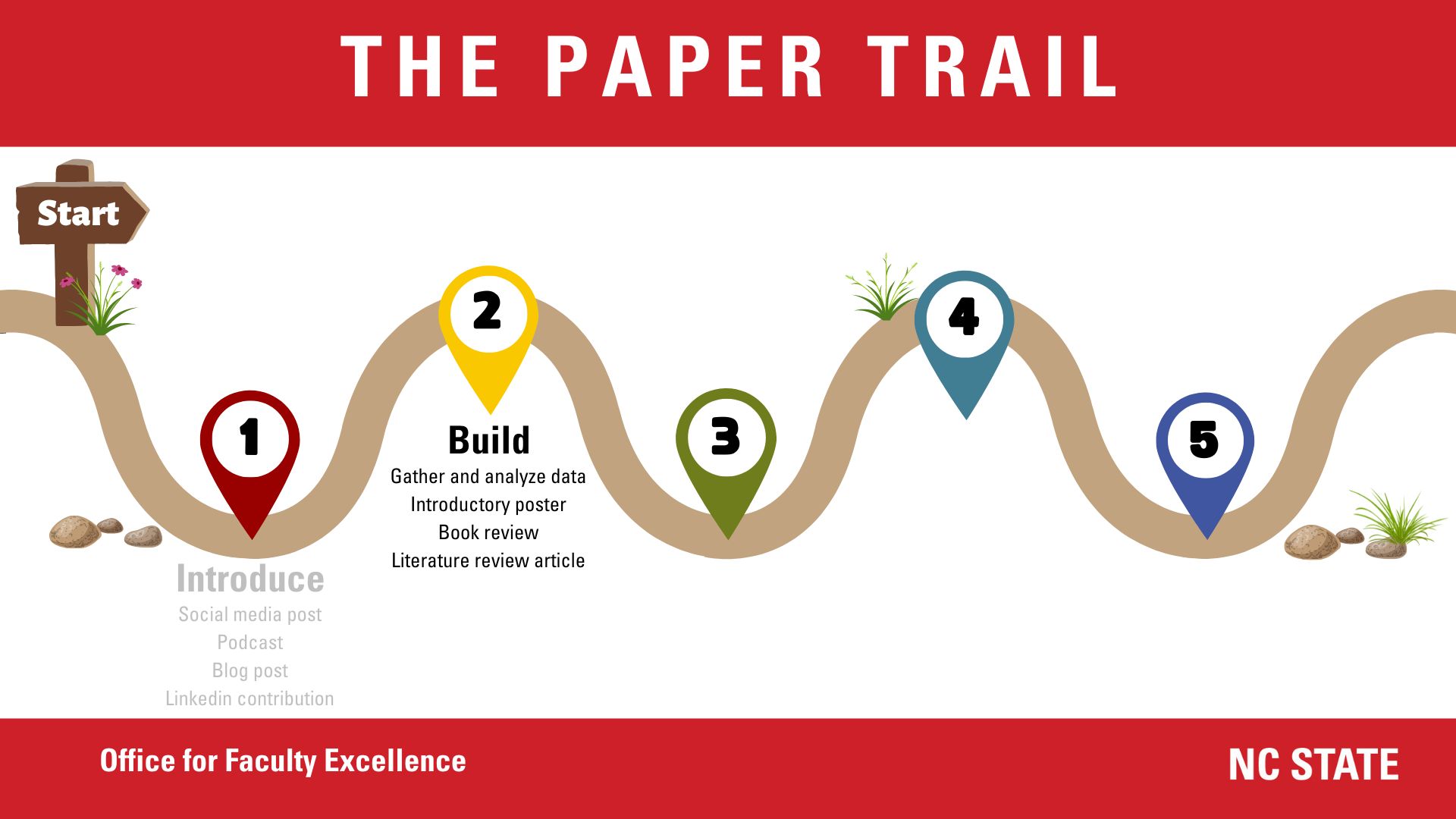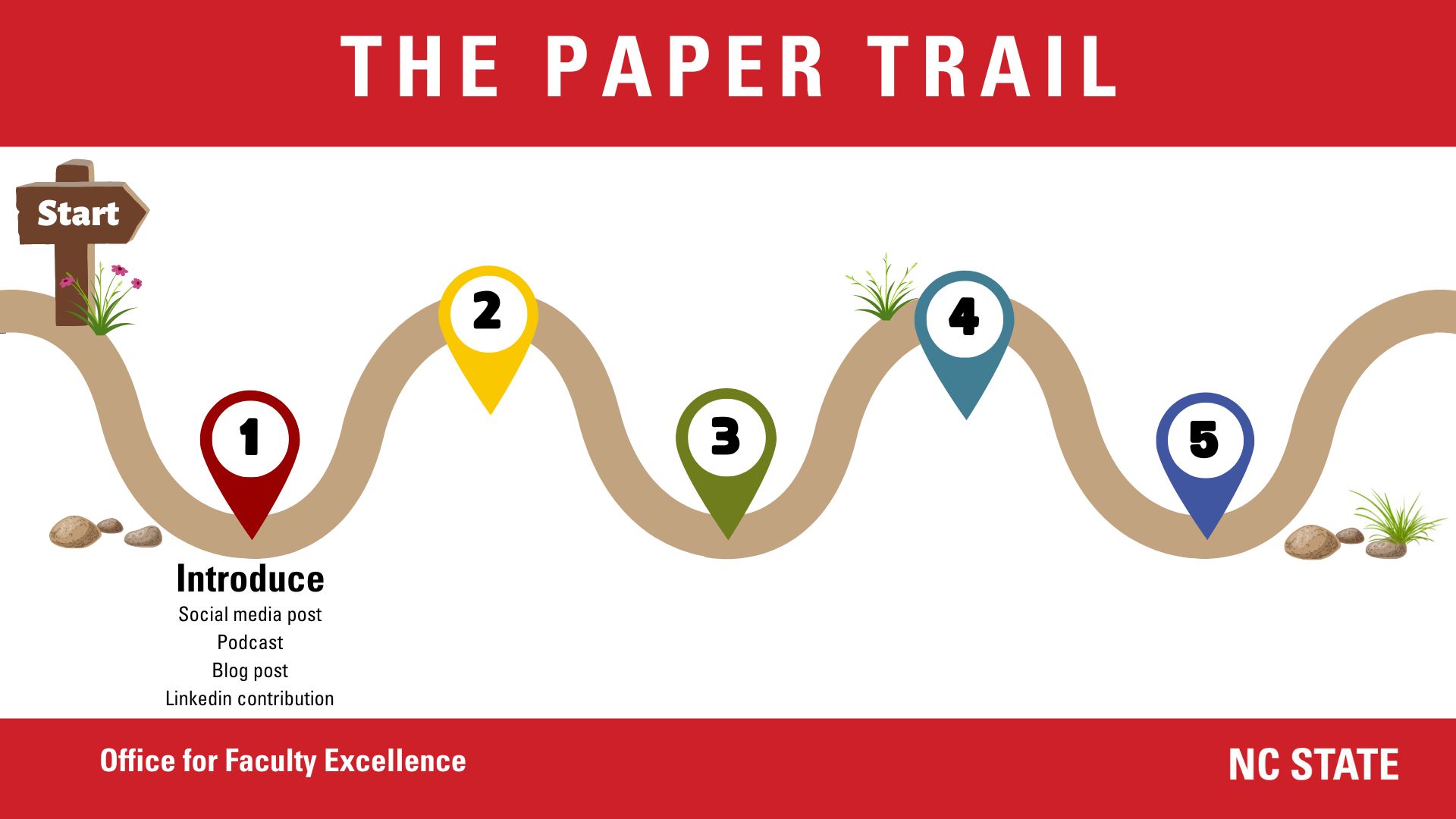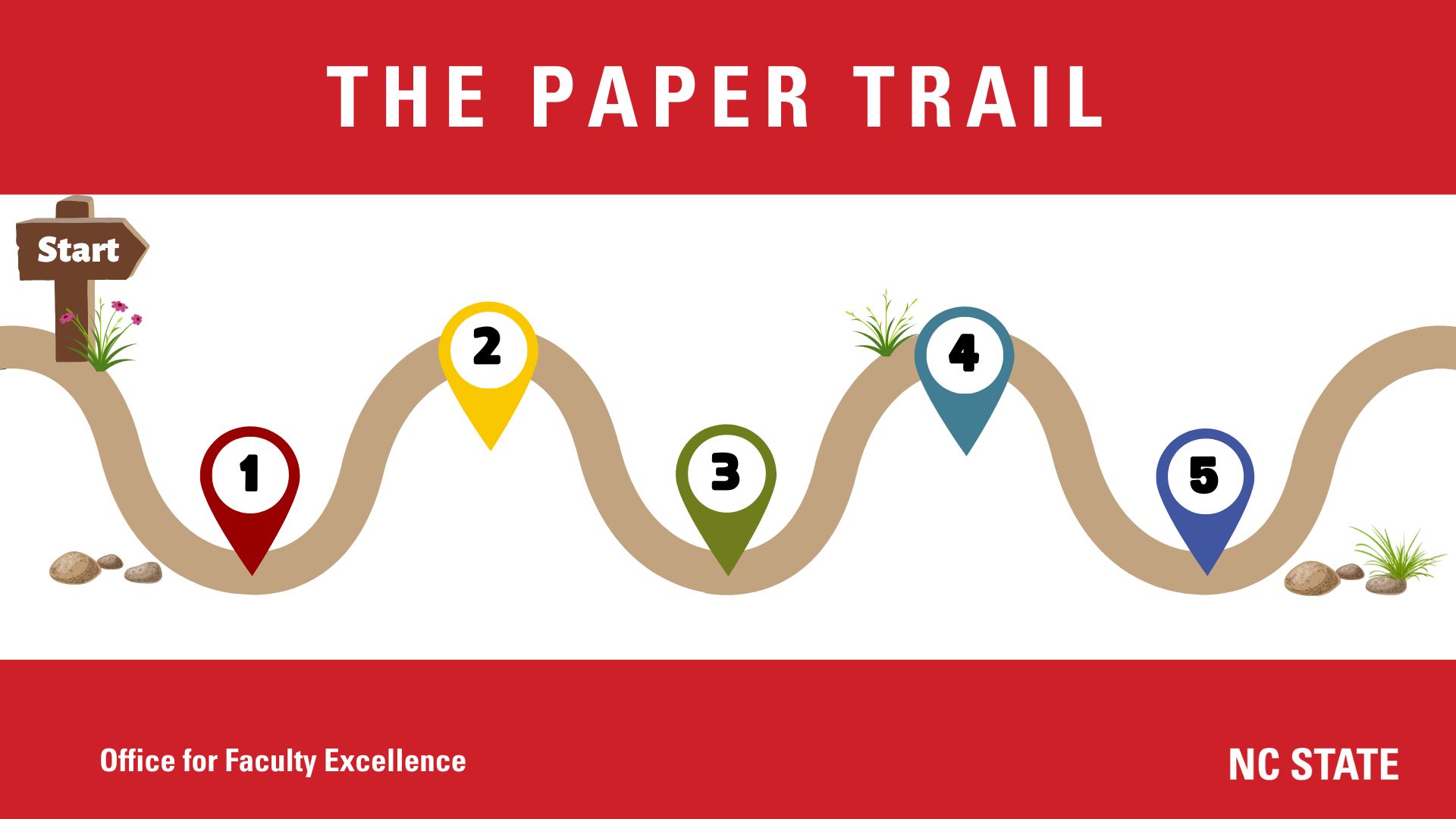OFE Newsletter: September 20, 2021
Mindful Mondays
 Every Monday at 9:00 a.m.
Every Monday at 9:00 a.m.- via Zoom
- You will receive an invitation within a week.
Start your week enjoying the benefits of mindfulness – calm focus, greater clarity, and positive energy! Join a community of NC State faculty and staff who are learning and practicing mindfulness-based stress reduction techniques together, in Zoom, every Monday at 9:00 a.m.
This program is suitable for all levels and open to NC State faculty and staff. No special equipment or training is needed. You must be an authenticated user to join the Zoom session link.
Sessions are led by faculty from the Department of Health and Exercise Studies.
Back to Basics: Active Reading
Our Fall Back to Basics series starts next week with Active Reading (Tuesday, September 28, 2021, 2:00-3:00 p.m. via Zoom):Active Reading documents are carefully prepared forms that guide students through the process of critical and careful reading. Come learn about the basics and application of this useful technique. Led by Dr. Maria Gallardo Williams, OFE SoTL Faculty Fellow.
Upcoming Award and Fellowship Deadlines
The following are select recognition opportunities with upcoming deadlines. Keep an eye out twice a month for new opportunities. Please direct any questions to the Director of External Faculty Awards and Recognition, Maria Almanza at maria_almanza@ncsu.edu
Institute for Citizens & Scholars Career Enhancement Fellowship
The Career Enhancement Fellowship seeks to increase the presence of minority junior faculty members and other faculty committed to eradicating racial disparities in core fields in the arts and humanities.
Junior Faculty Fellowship provides Fellows with a six-month or one-year sabbatical grant; a stipend for research and travel or publication; and participation in an annual conference/retreat. A total of 30 Fellowships are awarded each year.
Adjunct Faculty Fellowship provides Fellows with a six-month period during which to focus on research and scholarship necessary to secure a tenure-track position. Two fellowships are awarded each year.
Eligibility Snapshot (see full eligibility requirements)
- Open to Mellon Mays Undergraduate Fellowship Programs alumni; Minority junior faculty: African Americans, Latinos and Latinas, Native Americans, and Native Alaskans; Junior faculty with a demonstrated commitment to eradicating racial disparities, breaking down stereotypes, and promoting cross-racial understanding in their university communities.
- Must teach in one of the listed eligible fields in the humanities and social sciences (see website)
Deadline: Junior Faculty Fellowship Oct. 22; Adjunct Faculty Fellowship Nov. 5
AAUW Short Term Research Publication Grants
Short-Term Research Publication Grants provide support to scholars to prepare research manuscripts for publication. Preference given to applicants whose work supports the vision of AAUW: to break through educational and economic barriers so that all women have a fair chance. Fellowships can be awarded to both tenure-track and part-time faculty, and to new and established researchers. Fellowships are designed to assist candidates in obtaining tenure and other promotions. Open to all fields. Scholars engaged in science, technology, engineering and math or those researching gender issues are especially encouraged to apply. Candidates are evaluated on basis of scholarly excellence; quality and originality of project design; and active commitment to helping women and girls through service in their communities, professions, or fields of research. $6,000 is available for the eight-week grant period.
Eligibility Snapshot (see full eligibility requirements)
- Must be U.S. citizen or permanent resident
- Open to scholars who identify as women in all fields of study
- Tenured professors are not eligible
- Time must be available for eight consecutive weeks of final manuscript preparations. While many recipients will use the awards during summer, recipients may use funds any time during the fellowship year.
- Not for preliminary research. Grant supports drafting, editing, or modifying of manuscripts; replicating research components; responding to issues raised through critical review; and other initiatives to increase the likelihood of publication.
Deadline: Nov. 1
Huntington Library Fellowships
Long Term Awards: The Huntington offers fourteen Long-Term Fellowships for nine to twelve months in residence, each with a stipend of $50,000. Although nine of these are open to scholars working on projects in any area where The Huntington’s collections are strong, there are specific awards for maritime history (The Kemble Fellowship), the history of medicine (The Molina Fellowship) and the history of science (The Dibner Fellowships). Three awards (The Thom Fellowships) are reserved for recent post-doctoral scholars.
Short Term Awards: Approximately 140 Short-Term Fellowships are available for one to five months in residence and carry monthly stipends of $3,500. They are open to scholars in any field where The Huntington’s collections are strong.
Travel Grants: Six Travel Grants for Study Abroad are available in any of the fields in which The Huntington’s collections are strong and where the research will be carried out in libraries or archives outside of the United States or Canada, especially those in the UK, continental Europe, or Latin America. The Huntington will reimburse the grantee for economy round-trip airfare before the trip. A stipend of $3,500 will be paid after the grantee submits a detailed report on the research conducted. Travel grants can be taken as early as July 1, 2022, and no later than June 30, 2023. Tenure of fellowship: one month.
Eligibility Snapshot (see full eligibility requirements)
Long Term Awards
- See eligibility requirements based on type of fellowship here.
Short Term Awards
- Doctoral candidates who have advanced to candidacy (ABD) at the time of the application deadline (Nov. 15, 2021); faculty members; and other postdoctoral scholars.
Travel Grants
- Doctoral candidates who have advanced to candidacy (ABD) at the time of the application deadline; faculty members; and other postdoctoral scholars. Applicants must be based in North America.
Deadline: Nov. 15
National Academy of Education-Spencer Fellow
Supports 30 early career scholars working in critical areas of education research. These $70,000 fellowships support non-residential postdoctoral proposals that make significant scholarly contributions to the field of education. The program also develops the careers of its recipients through professional development activities involving National Academy of Education members. Applications are reviewed by NAEd members and are judged on the applicant’s past research record, career trajectory, and the quality of the project described in the application.
Eligibility Snapshot (see full eligibility requirements)
- Applicants must have received their PhD, EdD, or equivalent research degree between Jan. 1, 2015, and Dec. 31, 2020. Please note that this eligibility window has been extended to six years for this cycle only, to accommodate for the impact that COVID-19 has had on scholars’ research.
- Applicants may not hold tenure status at the time of the application deadline.
- Applications must be made by the individual applying for the fellowship. Group applications will not be accepted.
- Proposed project must be an education research project. NAEd funds studies that examine the efficacy of curriculum and teaching methods, however, we do not fund the initial development of curriculum or instructional programs.
Deadline: Nov. 15
Mellon Emerging Faculty Leaders Award
The Mellon Emerging Faculty Leaders Award is structured to free the time of jr. faculty who have passed their midpoint tenure review—including those from underrepresented groups and others committed to eradicating disparities in their fields—so that they can both engage in and build support systems, networks, and affinity groups that make their fields and campuses more inclusive. Emerging Faculty Leaders may be working in any field of the humanities or social sciences—including, for example, history, sociology, anthropology, literature, art, gender studies, ethnic/diaspora studies, and related fields—with an emphasis on scholarly topics that relate to or provide context for the study of culture, equity, inclusion, civil rights, and education in the Americas. Award will recognize candidates who not only balance research, teaching, and service but in fact give great weight to the creation of an inclusive campus community for underrepresented students and scholars. The selectors will focus on and privilege service and leadership activities that address and ameliorate underrepresentation on campus. The Mellon Emerging Faculty Leaders Award offers a $17,500 stipend—$10,000 to be used for summer research support and $7,500 for research assistance during the academic year. Ten awards will be made in 2021-22.
Eligibility Snapshot (see full eligibility requirements)
- Open to assistant professors in tenure-track appointments who are pursuing tenure
- Applicants will have successfully passed the standard third-year/midpoint review or their institution’s equivalent no later than January 31, 2022. Eligible applicants are typically in fourth or fifth year of tenure-track appointment and are still working to complete key items for the tenure dossier, which should not be scheduled for submission prior to the end of the award year (Summer 2023)
- Faculty who have already submitted the tenure dossier and/or who would be considered for tenure during the award year are ineligible
- Applicants must be U.S. citizens or permanent residents of U.S. as of December 1, 2020
Deadline: Dec. 1
Preparing for Difficult or Controversial Classroom Topics
- Sept. 24, 1:00-2:30 p.m.
- Via Zoom
- Hosted by Effective & Efficient Faculty
Faculty might need or want to teach topics that are marginalized, controversial, or otherwise new scholarly perspectives for students. Yet, many faculty are unsure of how to teach these topics in general and are additionally fearful of creating a negative learning environment for diverse students. Participants will learn how to lay an evidence-based foundation for teaching difficult or controversial topics. At the end, participants will have completed the first step of a detailed strategy for teaching these topics that is suited for their teaching style, discipline, campus, and students.
Upcoming Events for Faculty
Wednesday, Sept. 22
- Moodle Forums: Creating Dynamic Discussion Areas for Your Students, 10:00-11:30 a.m.
Thursday, Sept. 23
- Engagement in Synchronous and Asynchronous Classrooms, 1:00-2:00 p.m.
Monday, Sept. 27
- Mindful Mondays, 9:00-9:30 a.m.
- Research Forum (2021 Research Week at NC State Kickoff Event), 9:30-10:30 a.m.
- Categories:


